Last week, we took a look at the May 1938 issue of Western Trails. Let’s now look at the November 1943 issue. Cover by John Krank, which could be a pseudonym. The content structure looks similar to the earlier issue, two novelettes, seven short stories and one fact article.
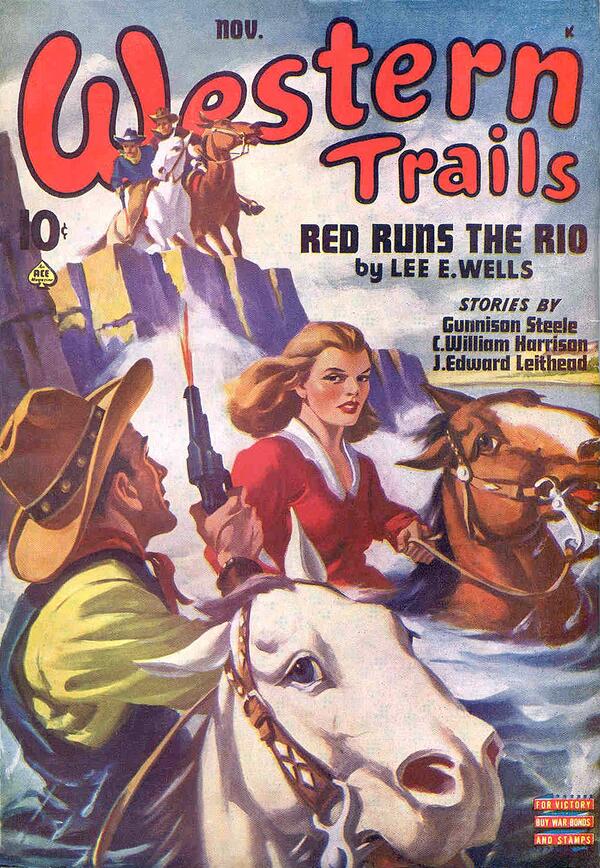
Western Trails [Vol. XXXVII No. 3, November 1943] ed. A. A. Wyn (Magazine Publishers, Inc., 10¢, 96pp, pulp, cover by James Krank)
4 · Red Runs the Rio · Lee E. Wells · nv
22 · The Make-Believe Marshal · Gunnison Steele · ss
28 · Polecat Payoff · Barry Gardner · vi
31 · Owlhoot Badge-Toter · J. Edward Leithead · ss
41 · Boom Town Betrayers · Martin Wolsey · ss
50 · Colt Mission for a Peaceful Hombre · C. William Harrison · nv
66 · Vigilante Vengeance · S. & I. Richin · ts
69 · Powdersmoke in Panamint · Felix Flammonde · ss
78 · Cold Deck for Two-Bit Jake · Stephen Payne · ss
82 · Stampede · Powder River Bill · lc
84 · Empty Holsters · Wilson L. Covert · ss
The novelettes have gotten a little shorter, allowing a couple more short stories to be squeezed in. The author payment rate remains at one cent and up, which is a pay cut once you account for inflation, which was almost 10% year over year in 1942 and 1943 alone.
The only way to make a living at that rate is to sell them a lot of stories, which is probably why there are two stories each from two authors. From Benny Gardner, one under his own name and another under his Gunnison Steele pseudonym; from J. Edward Leithead, one under his own name and another under his Wilson L. Covert pseudonym. The editor is Ruth Dreyer, a woman who is untraceable, but is likely a real person who was once assistant editor at Ranch Romances. At least one of the illustrations was reused from earlier issues, perhaps as a cost saving measure.
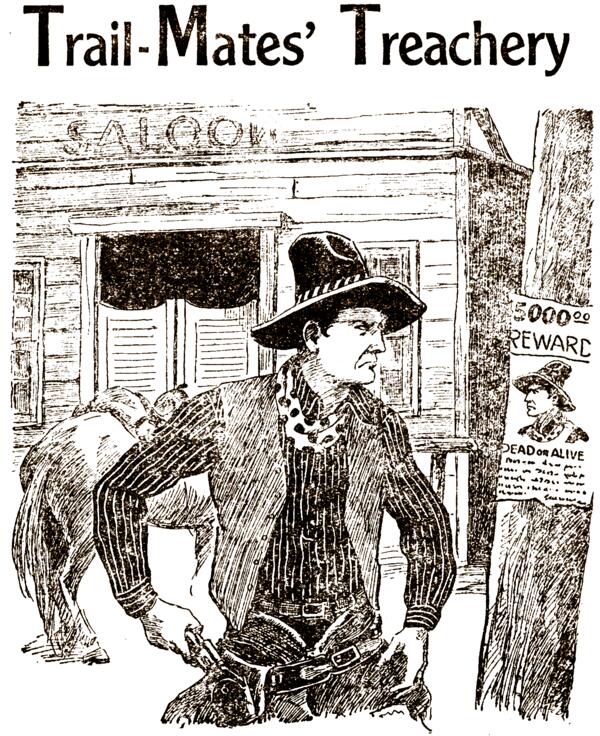
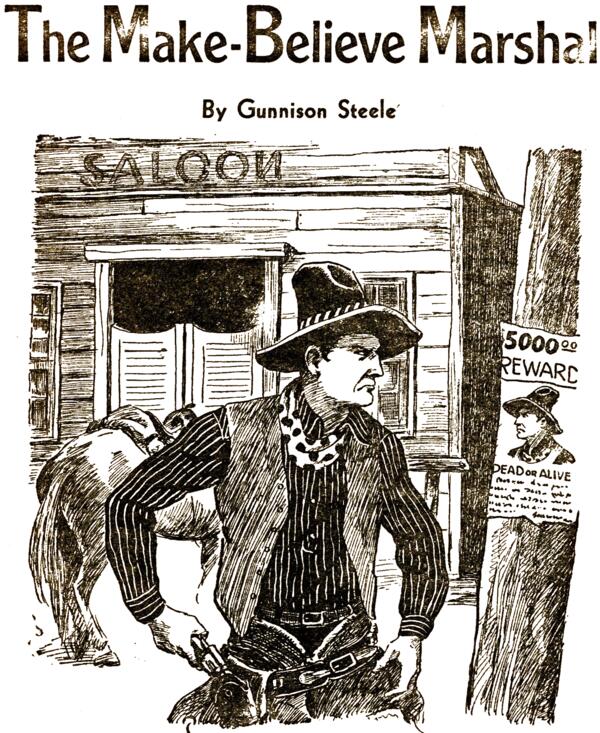
Red Runs the Rio by Lee E. Wells is as stereotypical as it gets. The hero rides into the trouble he’s looking for, the gang who killed his brother. A dozen pages later, the smoke and dust clears and the bad guys are dead, and our hero has become the local lawman.
Make-Believe Marshall by Gunnison Steele is the exact opposite. The protagonist is a wicked marshal who incited a man to rob a bank for a prank, and then shot him dead to collect the reward. Now he gets a second chance at a happy ending…
Polecat Payoff by Benny Gardner, the man behind Gunnison Steele, is also unusual, using no gun-play to resolve a tough situation. It also introduced me to skunk oil, which was apparently consumed as a rheumatism cure. Rather you than me, but the story is interestingly different from the usual.
Owlhoot Badge-Toter is a long story by J. Edward Leithead, dime novelist, prolific pulpster and scholar. Leithead contributed a long story and a short every month to Western Aces/Western Trails for several years. This is not one of his better efforts.
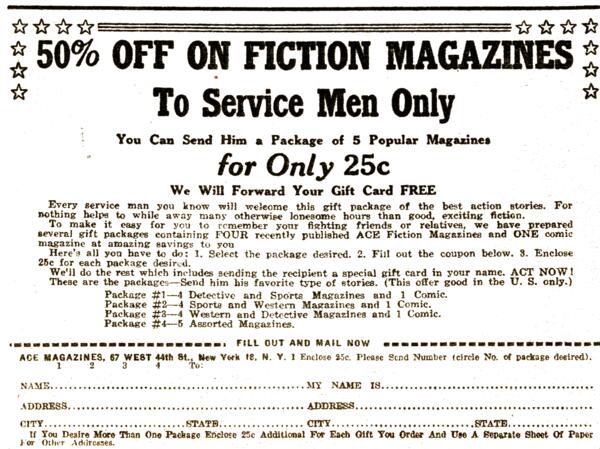
This 1943 issue has an offer from the publisher – pony up a quarter and an unlucky serviceman (the ad specifically excluded women, who were apparently too vital for the war effort) would get 4 or 5 assorted magazines as a gift. A good idea? Or was it a small scam to get rid of excess copies and returns? Maybe both.
Back to our original programming. Boom Town Betrayers by Martin Wolsey is incredible. Dreck, that is. In Colt Mission for a Peaceful Hombre C. William Harrison takes Frank Gruber’s Oliver Quade and Charles Boston to the west, dressed as cowboys. Their names are Rusty Shane and Sixty Jones, but the formula is the same. Shane is the slick know-it-all salesman who sells self-help books in addition to anything else the buyer wants, Sixty Jones provides the fat and muscle. The town’s name is Hazardville. Frank Gruber should have sued for plagiarism.
Seymour and Irving Richin supply the issue’s one fact article, about Henry Plummer, a sheriff suspected of being the brains behind an outlaw gang.
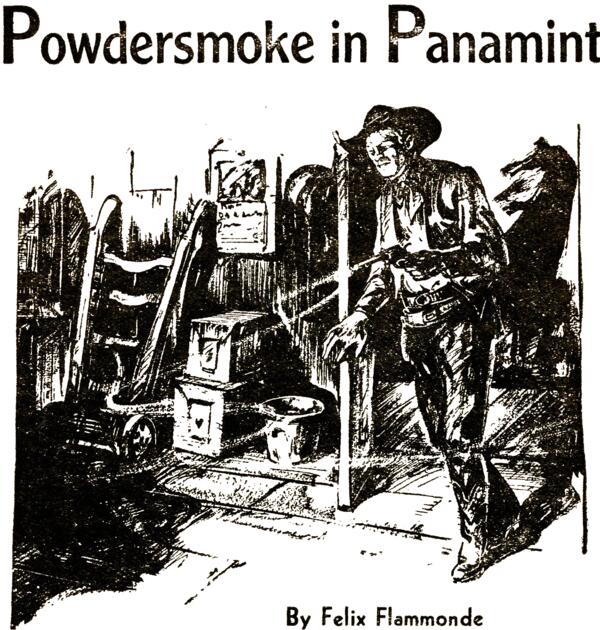
Clark Ashton Smith associate Felix Flammonde aka Diego del Monte delivers the goods in Powdersmoke in Panamint. This is a novel demonstration of the power of the press.
Cold Deck for Two-Bit Jake must have been one of Stephen Payne’s duds. Which is why it was sold here.
Powder Bill’s Stampede is still filled with teens and youth trying to connect with each other. They must have succeeded, because here we are.
Wilson L. Covert, Leithead’s alter ego, takes a standard western plot, man meets father of man he’s killed, and twists it a little. Not too much, and the obligatory happy ending doesn’t sit quite right with me.
An average issue, redeemed a little by the two Bennie Gardner stories. I’m aiming to read more stories by him in the future.
Reading these two issues, it’s clear that Western Trails aimed at a juvenile audience, competing with Street & Smith’s Wild West Weekly. Much of the fiction is not for adult readers today, but there are some interesting stories there. Worth a look if the price is right.